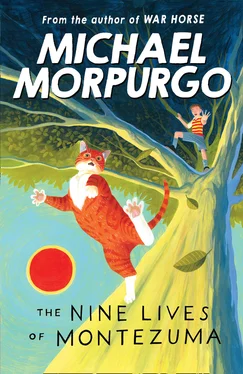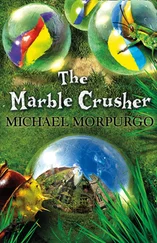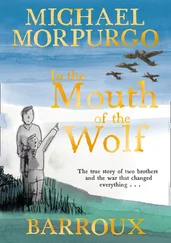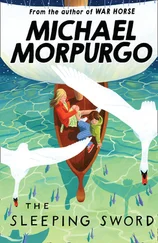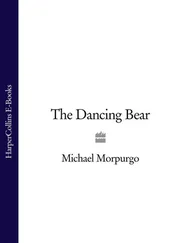The boy always fed the pigs after milking and then went back indoors where his mother would have a hot cup of tea waiting for him. He pulled off his boots, threw his coat in a corner and flopped down in the big kitchen chair by the stove.
‘Your father’s been and gone,’ said his mother, pouring out the tea automatically.
‘What’s he gone out for? He’d just about finished up when I left.’
‘He came in for a sack.’
‘What for?’ The boy tried his tea but it was too hot.
‘That old cat has had kittens again,’ his mother said.
‘You mean Kitty?’ The boy knew what had happened but wanted to know how. The kittens had been well hidden. ‘Where did he find them?’ he asked.
‘He said you were one bale short on the straw. There wasn’t enough for the yearlings.’ There was a hint of reproof in his mother’s voice. ‘So he had to go back into the big barn and fetch one and he found them in under the bale he picked up.’
‘How many, Mum?’
‘Didn’t say, but that Kitty never produces less than three or four.’
‘In the pond? Is that where he will do it?’
‘I expect so, dear; it usually is. Now drink your tea. It will get cold.’
As the boy sipped his tea and warmed his hands on the cup, he began to wonder how his father, normally the gentlest man he knew, could bring himself to do it. And that led on to his wondering if he himself was really right to be a farmer. He loved to raise the animals and watch them grow, but he found the killing difficult to take. Of course he knew that all his stock ended up in the abattoir, but that after all was how they made their living. It was a part of the farming and he could accept it, just so long as someone else did the killing. He could never contemplate killing with his own bare hands, not so close that you can feel and hear the animal. Shooting was different; there was sport in that, and anyway killing with a gun at a distance was no problem to him.
His father was back. The boy heard him stamp his boots outside the door and waited for the usual comment about his coat.
‘I see your coat’s on the floor again,’ said his father whipping off his stiff flat hat and hanging it up. ‘By gad, you youngsters these days, you’ll never learn.’
He ignored his father. ‘Did you drown them, Dad?’
‘All done,’ he said. ‘They were only just born. They wouldn’t know anything about it.’
‘How many did she have, Dad?’ the boy asked.
‘Two. Just two this time. It’s a business. I wish she’d go off and have them somewhere else. Silly old cat, she must know I’ve drowned more than half of the kittens she’s ever had. You’d think she’d have the sense to go elsewhere. Any tea left in the pot?’
‘Just two then, Dad? You didn’t see any more?’ His father shook his head. There had been three kittens, of that the boy was quite certain.
‘That old cat won’t miss them,’ said his mother. ‘Those we don’t drown she deserts before they’re properly weaned, and I know she eats them herself sometimes. She’s a terrible mother; we ought to have had her fixed years ago. Would’ve saved all this trouble.’
The boy stood up, mumbled something about leaving his torch behind in the pigs’ house, slipped his boots on and went out.
The lone kitten had managed to scramble about back up onto the bale which was his home. In a desperate search for his absent mother he had toppled off the bale and fallen into a deep crevasse between the bales below; and it was that that had saved his life. Stumbling about in the darkness he searched now for the warmth of his mother and cried out for her. He lifted his nose scenting the night air and explored every corner of his home. His family had gone, and the plaintive mewing turned to a cry of panic as the realisation that he was alone took hold of him.
It was this sharp cry that attracted the white owl perched in the beech tree by the pond. He had been watching a water vole that kept pushing its head out of its hole in the muddy bank by the stump of an old alder tree. He was waiting for it to emerge, but had the feeling that it might never happen. The cry from the barn was a reminder to him. He needed no further invitation. He knew the place and guessed from the fear in the cry that the kittens were alone. He circled the barn and came in to perch on the rafter just above the nest. Even before he landed he had spied the kitten alone and exposed, groping its way across the bale. The great black eyes focused and blinked. His head turned on his neck searching out the barn for the she-cat. But there was no sign of her. He paused momentarily to be sure and then lifted his wings and fell through the air, his legs outstretched, his talons spread.
From her hunting ground by the grain store, the old she-cat had heard her kitten. The hunting had been poor, and she knew she had left her kittens for too long. She came in under the big barn doors just as the owl took off. Within the space of a second she was by her kitten and standing her ground. The owl wheeled away only feet above the squirming kitten, shocked at the sudden intrusion; but he came back again with renewed fury. He had been certain of a kill. Three more times he came in, his talons almost touching the shecat’s paws, but the last time he saw the anger and ferocity in her eyes and he feared it. He knew the game was lost and with long powerful strokes of his great white wings he soared out of the barn and back up into the beech tree. There he snapped his beak in frustration and settled down to wait for a chance at his alternative kill, the water vole. But his vigil was disturbed by the approach of hurried footsteps across the yard and the dancing beam of a torch. He gave up in disgust and flew off, a silent white ghost in the night.
The boy pulled open the big barn door and shone his torch up at the place where he had seen the kittens. The she-cat was there and she was not alone. He approached slowly, climbing over the bales up towards her. Kitty blinked in the light and swallowed nervously. ‘It’s only me, Kitty. Won’t hurt you, you know that.’ He spoke in caressing tones until he could reach out and stroke her with his hand. Almost hidden underneath her and already suckling he found the surviving kitten, ginger with a white patch on his throat.
‘I’ve a good mind to take him into care,’ the boy said, still stroking the she-cat. ‘You’ve already lost at least two, and I shouldn’t wonder if you’ve eaten one or two yourself. You take care of him, you hear. He deserves to survive, that one does. What with you for a mother, and my father with his sack, he must be some cat to have survived; but he’s only got eight more lives you know. Best move him out of here; if my Dad finds him here he’ll go the same way as the other two. Understand?’
The boy left them in the barn and made his way home across the yard. It was beginning to rain and the raindrops slanted across the beam of his torch. He was singing inside.
THERE ARE PLACES ON A FARM WHERE NO one ever goes and it was to one of these that the she-cat carried her last surviving kitten. There was an old cob granary in one corner of the farmyard, so old and battered that it appeared almost to grow out of the stones of the yard. The only hint that it might have been man-made was the decaying corrugated iron roof that had replaced the thatch some years before. The building was used now to house the yearling cattle in winter, but the attic room above had been disused as long as anyone could remember. The floor-boards were rotten and loose, and the joists they rested on would no longer stand the weight of a man. Here a cat could live undisturbed, and here the she-cat came with her kitten to live.
Times were busy on the farm. The spring was late in coming and when the weather finally turned dry the ploughing had to take priority if the barley was to be tilled in time. At weekends the boy was left to manage most of the farm work on his own while his father rode out every morning, the plough hitched to the tractor, his lunch in his bag; and he came home only when the light failed in the evening. The boy worked well on his own, he had been well tutored by his father and had already acquired the farmer’s knack of working at a regular, unhurried pace, of moving amongst the stock with a calm confidence so that the animals barely seemed to notice he was there.
Читать дальше
